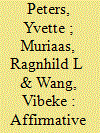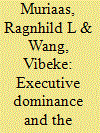| Srl | Item |
| 1 |
ID:
181835


|
|
|
|
|
| Summary/Abstract |
While the increase of women in elected office has received much scholarly attention, less attention has been paid to the dynamics of resisting gender quotas in countries that fail to adopt such measures despite regional and international pressure. We develop a context-sensitive typology of affirmative action measures that includes gender quotas and funding incentives and explore determinants of electoral candidates’ positioning in the context of Zambia. Using a sequential mixed-methods approach and unique data, we examine how candidates of different gender, party affiliation, and level of electoral success position themselves when asked to choose between different options. Intriguingly, electoral success and party allegiance – whether a candidate is affiliated with a current or former government party – are more important than gender. This finding is relevant for the debate on feminist democratic representation by showing that candidates are likely to have their more radical views muted when getting into position.
|
|
|
|
|
|
|
|
|
|
|
|
|
|
|
|
| 2 |
ID:
113180


|
|
|
|
|
| Publication |
2012.
|
| Summary/Abstract |
Quota policies securing the presence of marginalised groups in decision-making bodies have been adopted across sub-Saharan Africa. These policies are frequently understood through the lens of a pluralist perspective. This stance is not appropriate in African regimes characterised by executive dominance. Through a qualitative study of official documents, newspaper articles and interviews conducted during two field studies in Uganda in 2005 and 2010, this article shows how the understanding of quota policies in Africa may gain from the corporatist debate on interest representation. The analysis reveals that the incumbent National Resistance Movement has employed the reserved seat policy strategically to maintain its dominant position, and that strategies for using the quota system have evolved gradually over time in response to key political events, and the interests of group activists at the local and national levels with vested interests in its survival.
|
|
|
|
|
|
|
|
|
|
|
|
|
|
|
|
| 3 |
ID:
159555


|
|
|
|
|
| Summary/Abstract |
Tanzania and Uganda are among the most cited countries employing reserved-seat quotas. They adopted these quotas in 1985 and 1989, respectively. However, the two countries use different mechanisms to recruit reserved-seat members of parliament (MPs). Drawing on interview data from Tanzania and Uganda, this study compares the two models in terms of their effectiveness in facilitating the transfer of female MPs to non-quota seats in subsequent elections, thereby furthering women's sustainable representation. We find that the Tanzanian model is superior because it compartmentalises quota MPs in reserved seats less than the Ugandan model. The Ugandan model creates a gendered perception that constituency seats are for males and quota seats are for females – as if each sex has a distinct category of parliamentary seats. This perception affects each step of the switch to a non-quota seat, from the decision to switch to party nominations to voters’ decisions at the polls.
|
|
|
|
|
|
|
|
|
|
|
|
|
|
|
|